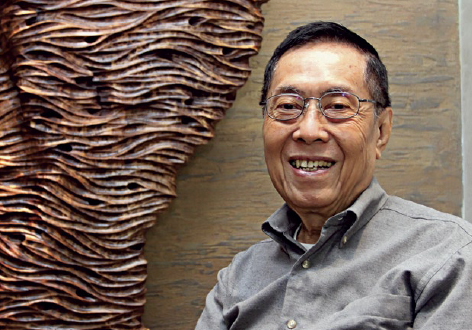Before receiving a Fulbright scholarship, Budi Darma, born in Rembang, Central Java, in 1937, received an East-West Center scholarship to study in Hawaii. “I lived there for one year in 1970 to prepare teaching materials on cultural studies that would be implemented in all Indonesian universities,” he said. His decision to go to Hawaii came at the recommendation of the late Professor Harsja W. Bachtiar, chairman of the Inter-Disciplinary Consortium of the Ministry of Education and Culture. “He emphasized that I must think about education for the future of Indonesia.”
“In August 1974, thanks to Professor Harsja again, I received a Fulbright scholarship to study for a master’s degree at Indiana University in Bloomington. I completed it on time and was accepted immediately into the doctoral program. With assistance from Professor Harsja and Paula Causey of the U.S. Embassy in Jakarta, I managed to get a scholarship from the Ford Foundation. I succeeded in my mission, at least in my view. With hard work, I now teach at several universities in Indonesia and abroad to apply what I gained in America.”
Budi Darma experienced a great deal in America. He said, “Perhaps the most interesting aspect was the quiet and peaceful environment, which led me to write Olenka, a collection of short stories about the people of Bloomington, and several other short stories and research on American and British literature.”
Following are the words of this leading writer and former rector of the Surabaya Institute of Teacher Training and Education (IKIP) about his experiences living in America:
“On the second day after I arrived in Bloomington, I was invited to dinner by my host family. Since I did not know the city well, the head of the family, a surgeon, asked his wife to pick me up at Eigenmann Hall, the largest student dormitory on campus. The dinner was very pleasant; the doctor talked about his experiences as a tourist in Indonesia and finally asked me about the image of America in Indonesia.
“I answered his question indirectly, by recounting instead a true story from Africa that I had read in a magazine some 15 years earlier. One day, in a village in Africa, an American movie was being screened. Because both the movie and the projector were so old, all of the scenes in the movie looked as if it was raining. The audience concluded that it rained every day in America, even in the bedrooms, and all the Americans were caught in the rain. But strangely, even though the Americans were rained on daily, they never got wet.
“A few weeks later, after I had made many friends where I was living in Eigenmann Hall, including with students from Africa, I retold this story, and they laughed uproariously. Indeed, such events have occurred in Africa, they said. One explained, ‘That is what led to Americans being considered sacred beings.’
“Relations between Indonesians and Americans in the United States are very good, similar to the relationship between Indians and Britons in England, but not in India during colonial times as described in the E.M. Forster novel A Passage to India. Two cultures, Indonesia representing the East and America representing the West, can communicate openly and with mutual respect.
“But do not talk about politics, because every conversation about politics gives rise to inaccurate perceptions about the political significance of peace and the political meaning of the domination of others. The Fulbright Program has succeeded in avoiding becoming politicized, and instead emphasizes cultural aspects and scientific knowledge.
“But, of course, there were some Indonesians and Americans in the United States with whom it was impossible to establish good relations. For them, the paradigm of Rudyard Kipling’s aphorism, ‘East is East and West is West and never the twain shall meet,’ still applies. Indonesians hung out with Indonesians and South and Southeast Asians, while Americans chose to hang out with other Americans or Europeans, Australians, and Canadians. Grouping together like this was seen especially on campus in the cafeteria or in buildings on the Commons. However, it can still be considered natural, since the further a person goes from his place of origin, the stronger the possibility that he will look for the roots of his own culture among people from similar cultures.
“In my opinion, in Indonesia-U.S. scholarly exchange programs, there is one small shortcoming: Indonesian scholars in America learn a lot about Indonesia in the United States based on available data and Indonesia experts there, while Americans in Indonesia more often learn by going directly into the field. For proof of this, look at the university libraries that offer Indonesian, Malay, or East Asia studies, beginning in Hawaii and ranging to the east and west coasts of America. The content of scholarly exchanges thus perhaps needs to be more balanced, so that Indonesian scholars in the United States will learn more about American-ness and not solely about Indonesian-ness.”
Last Updated: Aug 27, 2021 @ 9:50 am




